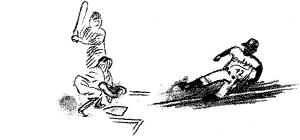Movie

The Devil's Advocate (Warner Bros.). Critics can't decide whether this fable by An Officer and a Gentleman director Taylor Hackford is good kitschy fun or a "never-never land of movie awfulness" (David Denby, New York). Praise goes to Al Pacino's frenetic performance as the devil--a Manhattan lawyer--who wants to corrupt his naive junior partner, played by Keanu Reeves. "[T]he best theater you'll see on screen this year," says Newsday's Jack Mathews. Others call the film's moralizing overwrought, its plot absurd, and Reeves' performance typically bad. (See the film's official site.)
Death
James Michener (1907-1997). The popular historical novelist doesn't get the usual posthumous reputation-inflation. Some critics continue to deride his mammoth tomes as hopelessly pedestrian, with "the formulaic plots and the formulaic prose and the formulaic leap to the top of the best-seller list" (the New York Times). Most critics grudgingly praise Michener's prolificacy, breezy prose, and extensive research, while gleefully bashing the snobbery of his highbrow bashers. (The hagiographic www.jamesmichener.com provides a bibliography and biography.)
Book
Jackie Robinson: A Biography, by Arnold Rampersad (Knopf). Despite the familiarity of the path-breaking ballplayer's story, critics mostly like the new biography. They deem its tone appropriately "admiring but not worshipful" (Richard Bernstein, the New York Times). And they praise its focus on Robinson's stubbornly independent political activism. (He campaigned for both the NAACP and Richard Nixon.) Its edge over other Robinson biographies: His wife gave the author, a Princeton professor, unprecedented access to his correspondence.

Theater
Side Show (Richard Rodgers Theatre, New York City). Mixed reviews for a musical about the tragic lives of a pair of Siamese twins. "One is astonished to see something so bold, offbeat, and unsettling is on Broadway," says USA Today's David Patrick Stearns. Critics are especially fascinated with the show's frank treatment of the twins' sex lives. They say wrenching portrayals by Emily Skinner and Alice Ripley set "a new standard for crackerjack Broadway teamwork" (Ben Brantley, the New York Times). Others call the score, by Dreamgirls writer Henry Krieger, un-catchy and uneven.

Architecture
New Jersey Performing Arts Center (Newark, N.J.). The centerpiece of a new plan for the decrepit city's renewal wins more praise for its intentions than for its design. Critics complain that Los Angeles architect Barton Myers' postmodern building, consisting of concert halls and theaters, looks like a "cineplex" (Mark Swed, the Los Angeles Times), with interiors that verge on kitsch (examples of overkill: steel rods poking out of ceilings; floors inlaid with colored stones). But complaints are downplayed because "the building's heart is in the right place" (Herbert Muschamp, the New York Times).
Fashion
Wearable Computers (Massachusetts Institute of Technology Media Lab). MIT computer nerds collaborate with Paris, Milan, and New York fashion schools on a line of clothes with embedded computers. The duds get heavier or lighter depending on climate, and they automatically play music in response to the wearer's moods. "The results looked like Versace melded with Blade Runner," says Newsweek's Steven Levy. Criticisms of the line: The computers do nothing useful, and the futuristic designs are not anything "people might actually want to wear" (Business Week).
Music
Psyché, by Cesar Franck (New York Philharmonic). Critics scratch their heads at the New York Philharmonic's penchant for reviving obscure works by lesser-known composers. This one--an 1888 symphony by a French Romantic composer--is called an "interesting failure" (Bernard Holland, the New York Times). Its overwrought, "meandering" score (Martin Bernheimer, Newsday) is accompanied by a highly praised and newly commissioned narration of the Psyché myth by playwright John Guare (Six Degrees of Separation).
Snap Judgments
The Weekly Standard's Christopher Caldwell bashes the New York Times Book Review. Its critics are mostly second-rate novelists who write turgid prose and "rave about demonstrably bad books." ... The New York Times' Janet Maslin calls Gummo, a movie about self-destructive teens, "the worst film of the year."
Update
The New York Times' Michael Kimmelman says that Frank Gehry's Guggenheim in Bilbao, Spain, "hogs the spotlight. ... [I]t is more compelling than much of the art inside."
Recent "Summary Judgment" columns
Movie--Seven Years in Tibet;
Movie--BoogieNights;
Fashion--Versace, Spring/Summer '98 Collections;
Product--Internet Explorer 4.0;
Award--Nobel Prize for Literature, Dario Fo;
Book--How the Mind Works, by Steven Pinker.
Movie--U-Turn;
Movie--Washington Square;
Movie--Soul Food;
Architecture--Guggenheim Museum (Bilbao, Spain);
Book--Toward the End of Time, by John Updike;
Death--Roy Lichtenstein.
Movie--The Edge;
Movie--The Peacemaker;
Book--Big Trouble: A Murder in a Small Western Town Sets Off a Struggle for the Soul of America, by J. Anthony Lukas;
Book--Timequake, by Kurt Vonnegut;
Music--Time Out of Mind, by Bob Dylan, and Bridges to Babylon, by the Rolling Stones;
Television--ER: "Ambush" (NBC);
Art--"Sensations: Young British Artists From the Saatchi Collection" (Royal Academy of Art, London).
Book--The Royals, by Kitty Kelley;
Book--Underworld, by Don DeLillo;
Book--Great Apes, by Will Self;
Art--"Robert Rauschenberg: A Retrospective" (Guggenheim Museums and Ace Gallery, New York);
Movie--A Thousand Acres;
Movie--The Ice Storm;
Television--Veronica's Closet (NBC).
--Compiled by Franklin Foer and the editors of Slate.
